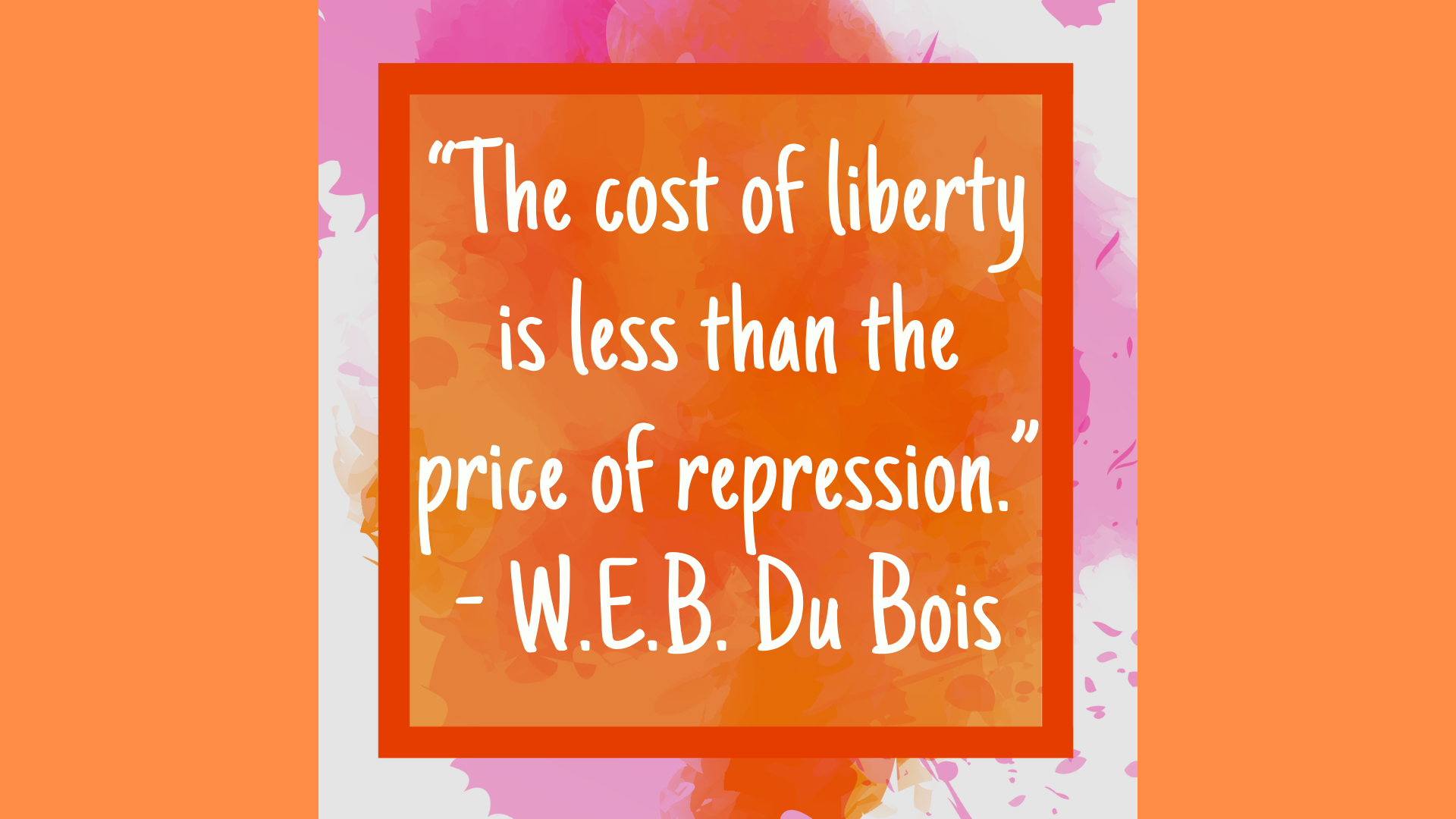Kay:
Thank goodness it’s Thursday! Welcome back Questers! It is February 4th, and this is Episode 284. We have a W. E. B. Du Bois quote for you today and he says, “The cost of liberty is less than the price of repression.”

Shi:
Alright, Shila here. You guys know I’m the sociologist head.
Kay:
She’s putting her glasses on as we speak…
Shi:
Du Bois is one of the cornerstones of sociology. If you go through any classes, you’ve got to learn some of his theories. One of the original founders of the NAACP, a historian, civil rights activist, author, and writer, he’s prominent through the turn of the century and through the twenties and even into the fifties a little bit. He was a big player for a long time, had a lot of amazing quotes and ideas and books and got increasingly radical as his life went on. Not surprising that he would bring us a quote like this, that is so incredibly thought-provoking especially considering the time period, the race, and everything that came behind Du Bois, “The cost of liberty is less than the price of repression.” The price of repression, I think is pretty steep. It’s expensive and it’s one that he encourages us to consider here.
Kay:
Now, if you’re anything like me, you probably went, “wait, what the what?” – right at the first reading of this quote, because oftentimes it’s easy to hear repression and think of oppression. So, for those of you who are wondering what is repression, I had to look up the definition too so let me just put it out here. It is the action of subduing someone or something by force. So, this definition can help us to understand the act of subduing someone or something by force. Now, if we’re going to talk, (let’s just pull up in into an economic seat really quick here) – because if we think about the cost of maintaining something as large as racial segregation within a country as large as the US. Just like the actual money that you would have to take in, the paperwork filing in the prisons that you’re putting people into, in the policing around keeping things separate in the city planning that has to be done around keeping things separate, in the school planning that has to be done…How much money, actual funded money gets spent on that repression, and how much less expensive it is when we don’t have to have all of that bureaucracy in the way in order to keep the repression going?
Shi:
You might think: no way, we’re not actively paying more money now to have this play out in our society. But the truth is these structures, institutions, and systems were based to maintain that lifestyle. So, maybe now it would be “more expensive” to make a course correction. Ultimately, we’re pretty sure that’s going to happen even if it’s in another few hundred years. Originally, those systems had to be set up and intentionally designed in order to continue that repression, which means there were extra checks and balances in place. It means they were “the test” for citizenship. It means all kinds of different things that initially required more investment and that’s just money. We’re not talking mental investment, emotional investment, obviously human life investment on both sides of liberty and repression happened at alarming rates in our history that are even sometimes hard to fathom. But if we even expand a little bit, our idea of what the “cost” is, we see that it’s huge for repression. It’s also huge for liberty – in the more repression and oppression there is the more that price for liberty is going to be.
Kay:
Now, it’s easy to talk about this on a societal level, especially from where we are at, in our history right now, but we want to just bring this down into a granular space really quick as we round out today’s episode. It’s easy to jump into that repression against a people and society and our history, and say, “Yeah, yeah. I understand that that happened,” but where are you repressing yourself? Where are you creating systems and rules around whatever pain or experience in your life that you’re looking to keep as is? Maybe you’re repressing yourself from some growth.
Shi:
Where you’ve probably heard the word, repression, is in repressed memories or repressed emotions. These are those moments or things in our lives, or feelings that we have that we actively engage in stomping away and holding back and pushing down and controlling in some way or another. By doing that means that we have to build, as Kate mentioned, all kinds of little systems around that. “I can’t drive down that street – it reminds me of that,” or, “I can’t watch that movie, it’s going to trigger that memory”. I can’t buy that thing because then I’m going to be constantly reminded of what it is that I’m trying to repress and keep away from. So, there’s all of this active investment in the repression of that rather than maybe facing it once and feeling the pain and then being liberated from that forevermore. It’s a great point to make Kay.
Kay:
So, as W. E. B. Du Bois reminds us, “The cost of liberty is less than the price of repression.”
Shi:
Alright, it’s #ThoughtfulThursday, which means you’ve got a Thinking Quest today. We want you to think about these questions; in what aspect of your life are you repressing something? What would it take and how would it feel to liberate that part of your world today? Think on this, and are you ready?
Kay & Shi:
Let’s quest!




